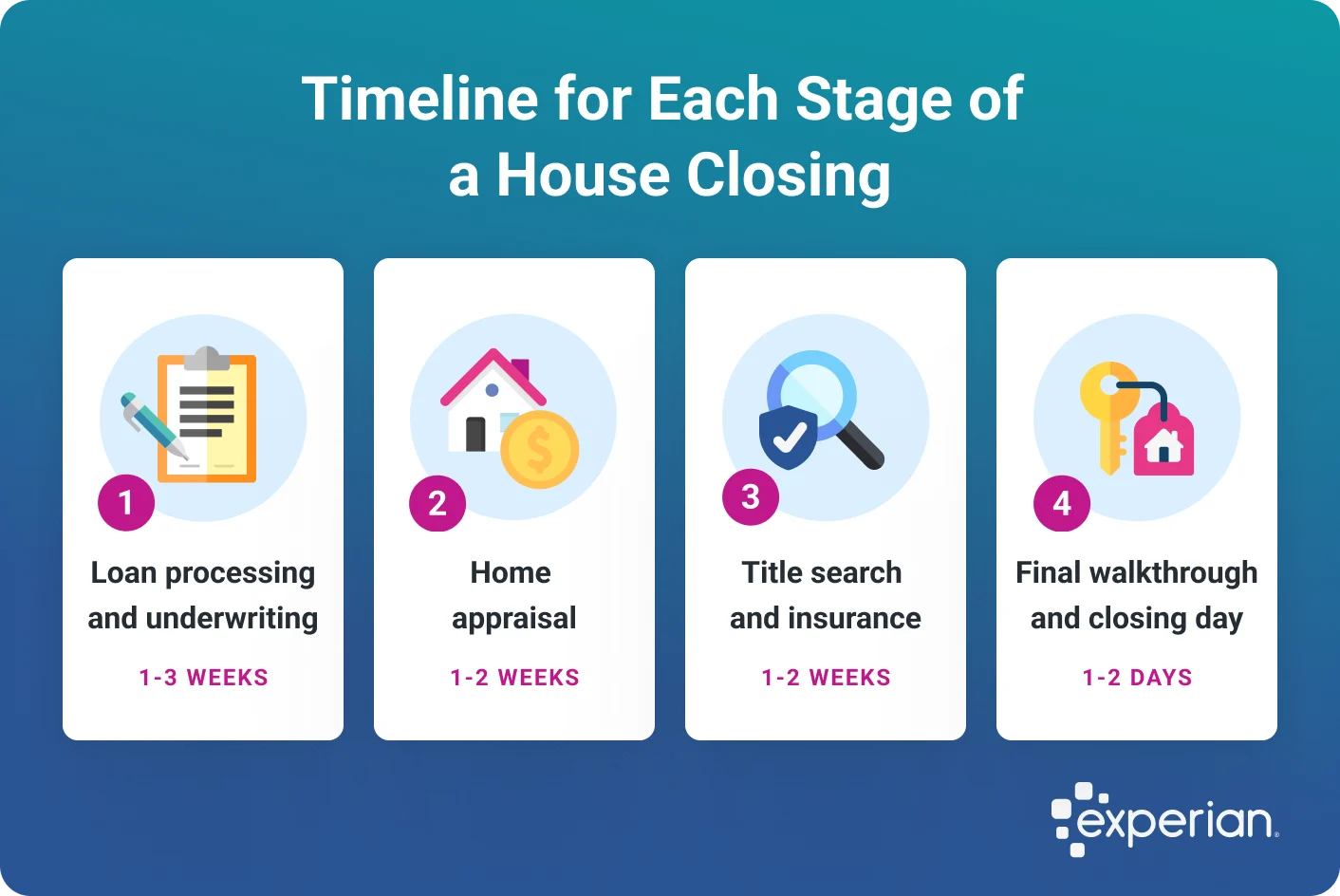How Long Does It Take to Close on a House?
Quick Answer
You can usually close on a house within 30 to 60 days, with the average falling somewhere in between. Closing quickly can provide several benefits, but to make that happen, you must understand what can delay the process.

So you've found the perfect home, made an offer and reached an agreement with the seller. But before you can get the keys for the home, there's still one more step—closing.
The big question now is how long will it take before you can move in? Closing on a house usually takes 30 to 60 days, though exact timelines vary depending largely on your inspections and your financing.
How Long Does It Take to Close on a House?
In most cases, it takes 30 to 60 days to close on a house. The average closing window runs from 40 to 45 days, according to PenFed Credit Union. Your time frame may be shorter or longer depending on the type of loan, how soon the appraisal is done and whether you've been preapproved, among other factors.
Your financing plays a significant role in your closing time. For example, closing on a Federal Housing Administration (FHA) loan may take a few days longer than a conventional loan due to more stringent requirements. Getting preapproved also allows you to get documents to your lender sooner, which could potentially save time later.
How the Closing Process Works

The closing process may appear daunting at first, but understanding the multiple steps required before you can get the keys can simplify it. Here's a breakdown of the steps involved and how long they take.
Loan Processing and Underwriting: 1-3 Weeks
Once you've selected the right lender and home loan to finance your home, submit a formal application to your lender. This can usually be completed in as little as an hour or within a day.
The lender will begin reviewing your financial details, including your income, assets, debts and credit history. You'll be asked to submit documents that back it all up, like pay stubs, W-2s and bank statements. An underwriter will also examine your application to assess your risk as a borrower and whether you meet the loan's eligibility requirements.
Underwriting may take from a few days to a few weeks, depending on how straightforward your application is and how busy your lender is. Some lenders offer a streamlined automated process that may only take a few days if the information you provide is accurate and current.
Home Appraisal: 1-2 Weeks
Your mortgage lender will order a professional home appraisal to calculate your home's value and confirm the loan isn't for more than the house is worth. The appraiser will look at recent sales of comparable homes in your area, along with your home's square footage, age, features and other considerations. Appraisals may take one or two weeks and cost between $350 and $550, depending on your market.
Title Search and Insurance: 1-2 Weeks
The title search confirms that the seller legally owns the home and checks for issues like unpaid liens or claims that could interfere with the sale. It usually takes a couple of weeks to complete, which is why it typically begins soon after you go into escrow. If everything is clear, the title company may issue title insurance to protect you and your lender in case a problem surfaces in the future.
Tip: Around this time, you'll want to purchase homeowners insurance so you can show proof of coverage before closing. Allow one to three days to obtain home insurance coverage.
Final Walkthrough and Closing Day: 1-2 Days
Once the previous steps are complete and the mortgage is approved, it's time for the final walkthrough. A day or two before closing, you'll have a chance to walk through the home one last time with your real estate agent. Use this visit to cross-check any repairs outlined in your contract to make sure they've been completed and that all the contingencies are addressed.
On closing day, you'll need a couple of hours to review all the documents to make sure they include everything you've agreed to. If everything looks correct and you understand the terms of your home loan, you'll sign the papers and pay your closing costs, which are typically between 2% and 5% of your loan amount.
Learn more: The Complete Guide to Closing on a House
Compare mortgage rates
Check today’s rates to find the best loan offers. Staying updated on current rates helps you secure a competitive mortgage and save more over time.
Benefits of Closing Quickly
Choosing a shorter closing timeline may benefit you in several ways.
- Make a stronger offer: Submitting an offer that includes a quick closing may help your offer stand out in a competitive market. A longer closing window means there are more opportunities for something to go wrong, so a faster closing may appeal to sellers looking for fewer complications.
- Lock in lower interest rate: A quick closing helps you secure the rate you locked when you apply. Most rate locks expire in 30 to 60 days. But if you anticipate needing more time, talk to your lender about locking in your rate for longer, though you might have to pay a fee to do so.
- Avoid extra costs: A faster closing timeline may help you avoid added charges, particularly when it comes to your interest rate. Lenders generally raise interest rates by 0.125% for every 15 days added to the standard 30-day rate lock period. So, if your closing is delayed by a month, you could end up paying 0.25% more. Keep your closing date inside your rate lock window to avoid the extra interest charges.
- Faster move-in: Closing early enables you to move in sooner, which may make it easier if you're trying to time your move with the end of a rental lease or the sale of your current home. For sellers, a faster closing time means they can stop making monthly mortgage payments sooner. Thay may help if they've purchased another home and are making two mortgage payments.
Learn more: Tools to Help You Navigate the Homebuying Process
What Can Delay the Closing Process?
Understanding what can go wrong during the closing process may help you avoid unnecessary delays. Here are some of the most common issues that can hold up your timeline:
- Financing issues: Missed payments, new accounts appearing on your credit report or a lower credit score are among the many financial factors that could delay or even derail your closing.
- Appraisal setbacks: Lenders look to the appraisal to verify the home is worth the amount you're paying. But the closing process could be delayed if the appraisal comes in too low. In that case, your lender could offer a smaller loan, order a second appraisal or ask the seller to drop their price. Rocket Homes reports that appraisal problems cause about 12% of home sales to fall through.
- Inspection surprises: The inspection could also slow down the closing if it uncovers major problems. If the buyer included an inspection contingency, they could walk away from the deal. They could also negotiate with the seller to make repairs or credit the cost in the sale price.
- Title complications: Unresolved title issues like a tax lien, claim on the property or even unpaid homeowners association (HOA) dues could also hold up the closing process. Title companies often recommend getting title insurance and a title search to discover these problems early and protect you legally.
- Paperwork errors: You may have up to 100 pages of paperwork to review and sign on closing day. It's essential to make sure they're complete, accurate and signed properly. Even a small mistake like a misspelled name or missing signature could require you to re-sign forms or resubmit information, which can push back your closing date.
- Contingency errors: If the offer includes contingencies for the inspection, appraisal or other contract conditions, the closing could take longer if an issue is found. For example, if a report is submitted late or a repair needs to be negotiated, your timeline may be pushed back.
Tip: Getting a home inspection contingency is usually a smart move. Minor repairs are to be expected, but you'll want to know about major issues before you're on the hook for the mortgage. Discovering an issue during closing could also give you time to negotiate a better price.
How to Avoid Delays When Closing
Some delays may be out of your control, but you might avoid others with a little planning. Take the following steps to help keep your closing on track and prevent unnecessary setbacks.
- Get preapproved. A preapproval may help you avoid a delay because your lender should already have many of the documents they'll need, including proof of income, bank statements and your credit report. Just keep in mind they may ask for updated versions later in the process.
- Have all documents ready. Be prepared with all the documents you'll need for the mortgage. Your lender will request documents that support the information in your mortgage application, and submitting them right away can help streamline the process.
- Schedule a home inspection quickly. The faster you get the inspection done, the more time you'll have to deal with any issues that are found. And in a busy market, inspectors may be backed up with work, so acting early may help you avoid delays.
- Choose a reputable lender. When shopping and comparing home loans, look at lender reviews and customer feedback to make sure you're working with an experienced lender. Working with experienced professionals may help avoid common mistakes and keep the process moving smoothly.
Tip: If you waived your financing contingency and your lender doesn't have the mortgage ready in time, you can risk losing your earnest money.
Learn more: Mistakes to Avoid When Closing on a Mortgage
Protect Your Credit During the Closing Process
It's imperative to avoid doing anything that could hurt your credit score during the closing process, like opening a new credit card or financing a new car. A big dip in your credit score could delay your closing or even cause your loan to fall through.
As you progress through the mortgage process, it's a good idea to regularly monitor your credit reports and FICO® ScoreΘ. You can check your Experian credit report for free and potentially spot any issues that could impact your mortgage approval. Work to resolve any issues you find immediately and notify your lender of any potential problems before it disrupts your closing.
Curious about your mortgage options?
Explore personalized solutions from multiple lenders and make informed decisions about your home financing. Leverage expert advice to see if you can save thousands of dollars.
Learn moreAbout the author
Tim Maxwell is a former television news journalist turned personal finance writer and credit card expert with over two decades of media experience. His work has been published in Bankrate, Fox Business, Washington Post, USA Today, The Balance, MarketWatch and others. He is also the founder of the personal finance website Incomist.
Read more from Tim